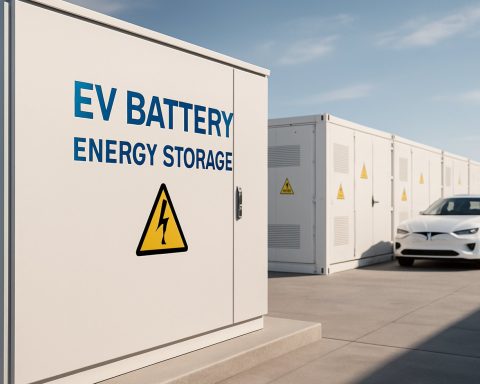Unprecedented Surge in Nuclear Energy Stocks
This week, the spotlight turned to nuclear energy investments as stocks soared, largely influenced by buzz surrounding artificial intelligence (AI) rather than governmental actions or subsidies.
NuScale Power’s shares experienced a remarkable rise of up to 34.5%, settling for a strong 27.3% gain. Similarly, Uranium Energy climbed 19.9% at its peak, finishing with a 13.1% increase. Powell Industries also enjoyed a notable ascent of 14.2%, closing up 11.3% for the week.
The World Economic Forum in Davos brought AI into the limelight, particularly when OpenAI announced a groundbreaking initiative named The Stargate Project. This ambitious project aims to invest $500 billion in AI infrastructure across the U.S. Funded by major players like Softbank and Oracle, it has sparked speculation about the energy needs tied to such monumental spending. The connection between AI investment and nuclear energy has become a hot topic, despite a lack of solid plans for building new nuclear facilities.
However, nuclear energy’s inherent challenges remain. Many industry experts believe it will be years, if not decades, before new plants begin production. This raises questions about the sustainability of current stock price surges. While optimistic projections exist, the reality could see continued volatility in the market as investors react to daily news cycles rather than stable fundamentals in the energy sector.
Wider Implications of a Nuclear Energy Renaissance
The recent uptick in nuclear energy stocks is a phenomenon that transcends mere financial metrics; it could redefine our societal and environmental landscape. As nations grapple with the implications of climate change, there is an increasing urgency for decarbonization. Nuclear energy presents a low-carbon alternative, enticing governments and industries to reconsider its role amid rising carbon emissions from traditional fossil fuels. If this trend maintains momentum, it could catalyze a cultural shift towards embracing nuclear as a viable power source, once vilified due to safety concerns stemming from accidents like Chernobyl and Fukushima.
The global economy stands to gain from increased reliance on nuclear energy. Energy diversification may foster stability in power supply, reducing dependency on volatile fossil fuel markets, which are often affected by geopolitical conflicts. Furthermore, an uptick in nuclear investment could stimulate job creation within the sector, from research in advanced reactors to construction and maintenance work, impacting local economies positively.
On the environmental front, the future of nuclear power carries significant implications. While existing plants produce minimal greenhouse gases, the long-term management of nuclear waste remains a contentious issue. Future trends may see innovations in waste recycling and the development of safer reactor designs, thus addressing historical concerns and possibly leading to a renaissance in public support for nuclear energy.
Ultimately, as society navigates this delicate balancing act between energy needs and environmental stewardship, the ongoing fluctuations in nuclear stocks reflect a dynamic interplay between technology, finance, and the ever-evolving global energy narrative.
Surging Nuclear Energy Stocks: The New Frontier for AI Investments
Unprecedented Surge in Nuclear Energy Stocks
In recent weeks, the nuclear energy sector has witnessed an extraordinary surge in stock prices, primarily fueled by the recent buzz surrounding artificial intelligence (AI) initiatives rather than traditional government policies or subsidies. This newfound interest in nuclear energy is indicative of broader market trends that intertwine energy infrastructure and technological advancements.
Stock Performance Overview
NuScale Power leads the pack, experiencing a dramatic increase of 34.5% at its peak and ultimately closing with a robust gain of 27.3%. Other notable stock performances include Uranium Energy, which saw its shares rise by 19.9% at the highest point, finishing with a respectable 13.1% gain. Powell Industries also benefited from this trend, reporting a rise of 14.2%, closing at 11.3% up for the week. These impressive figures highlight a growing investor confidence in the nuclear sector, driven by the potential energy demands associated with AI infrastructure development.
The Role of Artificial Intelligence in Energy
The World Economic Forum in Davos showcased the intersection of AI and energy with the announcement of The Stargate Project by OpenAI, which plans to invest $500 billion in AI-related infrastructure across the United States. Backed by significant players like Softbank and Oracle, this initiative has stirred discussions about the energy requirements that will accompany massive AI investments.
Analysts are closely examining how advancements in AI could relate to nuclear energy production, as growing energy needs could necessitate a more substantial investment in reliable energy sources, including nuclear power.
Challenges Ahead
Despite the positive momentum, the nuclear energy industry faces significant hurdles. Industry experts caution that it may take years or even decades before new nuclear power plants become operational. The timeline for constructing and commissioning new facilities is lengthy due to regulatory challenges, safety protocols, and public perception issues.
Moreover, the potential volatility of stock prices can be attributed to investors reacting to short-term news cycles rather than fundamental changes in the energy landscape. Analysts suggest that while there are optimistic forecasts for nuclear energy growth, the market could experience fluctuations based on external factors and investor sentiment.
Pros and Cons of Nuclear Energy Investments
Pros:
– Energy Security: Nuclear energy provides a stable source of power that can reduce dependence on fossil fuels.
– Low Emissions: It offers a low-carbon energy solution, which is increasingly vital in the context of climate change.
– Scalability: Potential for large-scale energy production aligns well with the rising electrification needs associated with technology advancements.
Cons:
– Public Perception: Concerns over safety and nuclear waste management can deter investors.
– Long-term Commitment: High initial investments and long development timelines pose risks to quick returns.
– Regulatory Hurdles: Navigating the complex regulatory environment can slow down project approvals.
Emerging Trends and Insights
The rising intersection between AI capabilities and nuclear energy solutions signals a transformative period for the sector. Innovative technologies enabled by AI can improve efficiencies in nuclear plant operations, predictive maintenance, supply chain management, and energy distribution systems. This synergy could offer a pathway for nuclear energy to adapt to changing market needs and enhance its viability as a complementary energy source in a more electrified, AI-driven future.
As the global focus shifts toward sustainable energy sources and emerging technologies, investor interest in nuclear energy is likely to grow. However, navigating the landscape requires careful consideration of the operational, financial, and regulatory challenges ahead.
For further insights, trends, and investment opportunities in energy and technology, visit Forbes.










